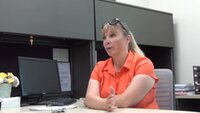| Title |
Alexander, Melina OH19_002 |
| Creator |
Weber State University, Stewart Library: Oral History Program. |
| Contributors |
Alexander, Melina, Interviewee; Story, Sarah, Interviewer; Tooker, Sarah, Video Technician |
| Description |
The Beyond Suffrage Project was initiated to examine the impact women have had on northern Utah. Weber State University explored and documented women past and present who have influenced the history of the community, the development of education, and are bringing the area forward for the next generation. The project looked at how the 19th Amendment gave women a voice and representation, and was the catalyst for the way women became involved in the progress of the local area. The project examines the 50 years (1870-1920) before the amendment, the decades to follow and how women are making history today. |
| Abstract |
The following is an oral history interview with Dr. Melina Alexander, conducted on July 25,2019, in her office, by Sarah Storey. Melina discusses her life, her memories, at Weber State University, and the impact of the 19th Amendment. Sarah Tooker, the video technician, is also present during this interview.; The following is a video clip of an oral history interview with Dr. Melina Alexander describing the impact of the 19th Amendment. |
| Subject |
Voting--United States; Universities and colleges; Education, Elementary; Education, Secondary; Women in higher education; Universities and colleges--Faculty; Women--Rights of women; Women--suffrage |
| Keywords |
Teacher Educators; Women's Rights; Female Voters; Gender Equality |
| Digital Publisher |
Stewart Library, Weber State University, Ogden, Utah, United States of America |
| Date |
2019 |
| Date Digital |
2019 |
| Temporal Coverage |
1964; 1965; 1966; 1967; 1968; 1969; 1970; 1971; 1972; 1973; 1974; 1975; 1976; 1977; 1978; 1979; 1980; 1981; 1982; 1983; 1984; 1985; 1986; 1987; 1988; 1989; 1990; 1991; 1992; 1993; 1994; 1995; 1996; 1997; 1998; 1999; 2000; 2001; 2002; 2003; 2004; 2005; 2006; 2007; 2008; 2009; 2010; 2011; 2012; 2013; 2014; 2015; 2016; 2017; 2018; 2019 |
| Medium |
oral histories (literary genre) |
| Spatial Coverage |
Fort Bragg, Mendocino, California, United States, http://sws.geonames.org/5350039, 39.44572, -123.80529; Ogden, Weber County, Utah, United States, http://sws.geonames.org/11788968, 41.22809, -111.96766 |
| Type |
Text; Image/StillImage; Image/MovingImage |
| Access Extent |
PDF is 45 pages; Video clip is an mp4, 41.0 MB |
| Conversion Specifications |
Filmed using a Sony HDR-CX430V digital video camera. Sound was recorded with a Sony ECM-AW3(T) bluetooth microphone. Transcribed using Express Scribe Transcription Software Pro 6.10 Copyright NCH Software. |
| Language |
eng |
| Rights |
Materials may be used for non-profit and educational purposes, please credit University Archives; Weber State University |
| Source |
Alexander, Melina OH19_002 Weber State University Archives |
| Format |
application/pdf; video/mp4 |
| ARK |
ark:/87278/s6n3tvm2 |
| Setname |
wsu_bs_oh |
| ID |
105414 |
| Reference URL |
https://digital.weber.edu/ark:/87278/s6n3tvm2 |
| Title |
Alexander, Melina OH19_002 |
| Creator |
Weber State University, Stewart Library: Oral History Program. |
| Contributors |
Alexander, Melina, Interviewee; Story, Sarah, Interviewer; Tooker, Sarah, Video Technician |
| Description |
The Beyond Suffrage Project was initiated to examine the impact women have had on northern Utah. Weber State University explored and documented women past and present who have influenced the history of the community, the development of education, and are bringing the area forward for the next generation. The project looked at how the 19th Amendment gave women a voice and representation, and was the catalyst for the way women became involved in the progress of the local area. The project examines the 50 years (1870-1920) before the amendment, the decades to follow and how women are making history today. |
| Abstract |
The following is an oral history interview with Dr. Melina Alexander, conducted on July 25,2019, in her office, by Sarah Storey. Melina discusses her life, her memories, at Weber State University, and the impact of the 19th Amendment. Sarah Tooker, the video technician, is also present during this interview. |
| Image Captions |
Melina Alexander Circa 2010; Melina Alexander Circa 2010; Melina Alexander in Australia Circa 2010; Melina Alexander 25 July 2019 |
| Subject |
Voting--United States; Universities and colleges; Education, Elementary; Education, Secondary; Women in higher education; Universities and colleges--Faculty; Women--Rights of women; Women--suffrage |
| Keywords |
Teacher Educators; Women's Rights; Female Voters; Gender Equality |
| Digital Publisher |
Stewart Library, Weber State University, Ogden, Utah, United States of America |
| Date Digital |
2019 |
| Temporal Coverage |
1964; 1965; 1966; 1967; 1968; 1969; 1970; 1971; 1972; 1973; 1974; 1975; 1976; 1977; 1978; 1979; 1980; 1981; 1982; 1983; 1984; 1985; 1986; 1987; 1988; 1989; 1990; 1991; 1992; 1993; 1994; 1995; 1996; 1997; 1998; 1999; 2000; 2001; 2002; 2003; 2004; 2005; 2006; 2007; 2008; 2009; 2010; 2011; 2012; 2013; 2014; 2015; 2016; 2017; 2018; 2019 |
| Medium |
oral histories (literary genre) |
| Spatial Coverage |
Fort Bragg, Mendocino, California, United States, http://sws.geonames.org/5350039, 39.44572, -123.80529; Ogden, Weber County, Utah, United States, http://sws.geonames.org/11788968, 41.22809, -111.96766 |
| Type |
Text; Image/StillImage |
| Access Extent |
PDF is 45 pages |
| Language |
eng |
| Rights |
Materials may be used for non-profit and educational purposes, please credit University Archives; Weber State University |
| Source |
Alexander, Melina OH19_002 Weber State University Archives |
| Format |
application/pdf |
| Setname |
wsu_bs_oh |
| ID |
105517 |
| Reference URL |
https://digital.weber.edu/ark:/87278/s6n3tvm2/105517 |





